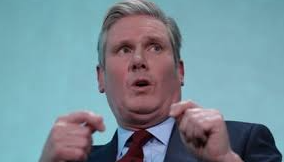
Labour leader outlines commitment to £28 billion green spending, while emphasising the importance of fiscal discipline in future budgets.
Keir Starmer has stressed that Labour’s pledge to invest £28 billion annually in green initiatives is constrained by the party’s fiscal rules. In his speech at the Resolution Foundation conference in London, Starmer acknowledged that while Labour is committed to ramping up investment, the government would not be able to simply “open the spending taps” in the next term.
The Labour leader faced probing questions about the sustainability of his spending plans and whether the £28 billion pledge, initially promised in 2021, had been watered down. Originally set as a commitment to spend £28 billion each year on environmental projects until 2030, Labour has since revised this target to focus on reaching that figure during the second half of its first term. Shadow Chancellor Rachel Reeves had confirmed this adjustment in June, stating that the target would be a goal to work towards, rather than an immediate commitment.
Starmer, however, was clear that the £28 billion initiative would be used to leverage additional private sector investment and would not be delayed until the mid-term. He reiterated that the plan is subject to Labour’s fiscal rules, which include balancing day-to-day spending with tax receipts and reducing national debt as a percentage of the economy.
The fiscal framework, according to Starmer, is central to Labour’s economic approach. “Those fiscal rules are not a straitjacket, but the foundation for everything we do,” he said, confident that through fostering economic growth, the necessary investment could be achieved within those constraints.
The speech follows recent statements from Chancellor Jeremy Hunt, who has suggested that public service cuts may be necessary after 2024, as part of the government’s budgetary strategy. Starmer criticised Hunt’s approach, accusing him of using “fiscal sleight of hand” and of jeopardising Britain’s prosperity for political gain. He refrained from commenting directly on whether Labour would rule out cuts to public services, instead highlighting the need for reform through improved public sector efficiency, including the use of AI and data.
Starmer also defended his praise of former Conservative Prime Minister Margaret Thatcher, noting that while he disagreed with her policies, he respected her vision and leadership. “You don’t have to agree with someone to recognise they had a mission and a plan,” he explained.












